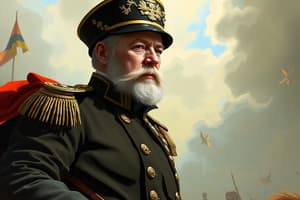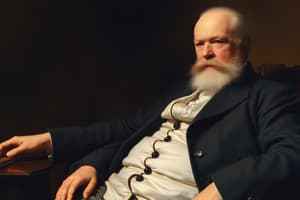Podcast
Questions and Answers
Which of the following statements about Germany in 1871 is true?
Which of the following statements about Germany in 1871 is true?
- Austria was smaller than Prussia.
- Germany did not exist as a unified state. (correct)
- Germany was ruled by Kaiser Wilhelm I.
- Germany was unified at this time.
The Congress of Zollverein was created in 1815 as a strong political union of all German states.
The Congress of Zollverein was created in 1815 as a strong political union of all German states.
False (B)
Who did Kaiser Wilhelm I hire to assist in the unification of Germany?
Who did Kaiser Wilhelm I hire to assist in the unification of Germany?
Count Otto von Bismarck
Germany was unified through __________, meaning 'by any means necessary.'
Germany was unified through __________, meaning 'by any means necessary.'
Match the following concepts with their descriptions:
Match the following concepts with their descriptions:
What was the main strategy Bismarck employed to deal with Austria?
What was the main strategy Bismarck employed to deal with Austria?
The Franco-Prussian War took place from July 1870 to January 1871.
The Franco-Prussian War took place from July 1870 to January 1871.
Who was upset with Bismarck after the Austro-Prussian War?
Who was upset with Bismarck after the Austro-Prussian War?
Bismarck's final plan involved provoking a war with ______ to achieve German unification.
Bismarck's final plan involved provoking a war with ______ to achieve German unification.
Match the following royal families with their respective countries:
Match the following royal families with their respective countries:
What was the outcome of Bismarck canceling Kulturkampf?
What was the outcome of Bismarck canceling Kulturkampf?
The Communist Manifesto, written by Karl Marx, supports the idea of a peaceful transition to democracy.
The Communist Manifesto, written by Karl Marx, supports the idea of a peaceful transition to democracy.
What major foreign policy did Wilhelm II introduce after taking over?
What major foreign policy did Wilhelm II introduce after taking over?
_______ was a guerilla war fought in South Africa between the British and the Dutch Empire over gold.
_______ was a guerilla war fought in South Africa between the British and the Dutch Empire over gold.
Match the following leaders or figures with their associated actions or characteristics:
Match the following leaders or figures with their associated actions or characteristics:
What significant event did Bismarck manipulate to provoke France into declaring war?
What significant event did Bismarck manipulate to provoke France into declaring war?
France was fully prepared for war against Germany in 1870.
France was fully prepared for war against Germany in 1870.
What was the outcome of the siege of Paris that began in 1870?
What was the outcome of the siege of Paris that began in 1870?
The primary challenge Bismarck organized against Catholics in Germany is known as the _________.
The primary challenge Bismarck organized against Catholics in Germany is known as the _________.
Match the following events with their corresponding outcomes:
Match the following events with their corresponding outcomes:
Which of the following was NOT a conflict mentioned in the context of France prior to 1870?
Which of the following was NOT a conflict mentioned in the context of France prior to 1870?
Germany was formed as a unified nation in 1871 after victory over France.
Germany was formed as a unified nation in 1871 after victory over France.
What was the main issue that caused Bismarck to become upset after the French rebel defeat?
What was the main issue that caused Bismarck to become upset after the French rebel defeat?
Flashcards
Realpolitik
Realpolitik
A political strategy emphasizing practical and realistic goals, often achieved through cunning or force, rather than idealistic principles.
Zollverein
Zollverein
A loose customs union formed in 1815 among some German states, facilitating trade and economic cooperation.
Forging States
Forging States
Uniting a country by conquering and incorporating smaller states, used by Prussia to achieve German unification.
Bismarck's Unification of Germany
Bismarck's Unification of Germany
Signup and view all the flashcards
Otto von Bismarck
Otto von Bismarck
Signup and view all the flashcards
Bismarck's Strategy in the Austro-Prussian War
Bismarck's Strategy in the Austro-Prussian War
Signup and view all the flashcards
The Austro-Prussian War (1866): A Key Step to Unification
The Austro-Prussian War (1866): A Key Step to Unification
Signup and view all the flashcards
The "Seven Weeks War"
The "Seven Weeks War"
Signup and view all the flashcards
Bismarck's Final Plan
Bismarck's Final Plan
Signup and view all the flashcards
The Franco-Prussian War
The Franco-Prussian War
Signup and view all the flashcards
Kulturkampf
Kulturkampf
Signup and view all the flashcards
Communist Manifesto
Communist Manifesto
Signup and view all the flashcards
Weltpolitik
Weltpolitik
Signup and view all the flashcards
Boer War
Boer War
Signup and view all the flashcards
Russia's 'sneaky' strategy
Russia's 'sneaky' strategy
Signup and view all the flashcards
Ems Dispatch
Ems Dispatch
Signup and view all the flashcards
Post-Napoleonic France
Post-Napoleonic France
Signup and view all the flashcards
French Isolation
French Isolation
Signup and view all the flashcards
Siege of Metz
Siege of Metz
Signup and view all the flashcards
Surrender at Sedan
Surrender at Sedan
Signup and view all the flashcards
Gambetta's Resistance
Gambetta's Resistance
Signup and view all the flashcards
Treaty of Frankfurt
Treaty of Frankfurt
Signup and view all the flashcards
German Parliament
German Parliament
Signup and view all the flashcards
Study Notes
Germany's Unification
- Germany did not exist as a single nation in 1871, with various independent states (like Prussia, Austria, Bavaria, etc.).
- Traces of Germanic people date back to the Stone Age.
- Two largest states were Prussia and Austria.
Congress of Vienna and Zollverein
- The Congress of Vienna (1815) created a loose customs union (Zollverein) among some German states.
1848 Attempts at Unification
- Attempts to unite Germany in 1848 failed.
Prussian Hegemony
- Prussia, led by Wilhelm I, aimed for German unification.
Three Steps to Unification
- Defeat Austria
- Defeat France
- Religious Reformer (Martin Luther) protesting Catholicism created Protestants.
Otto Von Bismarck
- Bismarck, the Chancellor/Prime Minister, skillfully navigated the process of unification.
- He prioritized Realpolitik ("realistic politics")--achieving goals by any necessary means.
Austro-Prussian War (1866)
- The war between Prussia/ the rest of the German states against Austria led to a Prussian victory.
- Austria was removed from the German Confederation.
Franco-Prussian War (1870-1871)
- Bismarck strategically provoked a war with France.
- The conflict resulted in a decisive Prussian victory.
- France ceded territories (Alsace-Lorraine) to Germany.
- This led to the creation of a unified German Empire in 1871.
War Technology
- Bismarck introduced advanced repeating guns during the wars, which were an important factor behind Prussian victories.
German Empire (1871)
- The unification of Germany resulted in a powerful new empire.
Studying That Suits You
Use AI to generate personalized quizzes and flashcards to suit your learning preferences.




